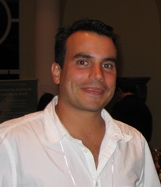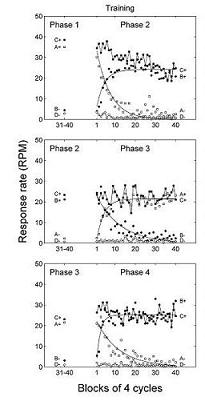|
Paulo Guilhardi |
|
|
Assistant Professor (Research) Office: Hunter Lab 314 Phone: (401) 863-3979 / 935-0196 |
|
|
Paulo Guilhardi received his bachelor degree in Psychology from
Universidade Federal de São Carlos, Brazil, in 2000. As an undergraduate working
with Dr. Deisy das Graças de Souza in the Laboratory for the Studies of Human
Behavior (LECH), he developed procedures to improve reading comprehension in
children that failured to read when standard teaching protocols in public
schools in Brazil were used. Under Dr. de Souza mentorship, he also received
a research fellowship (PIBIC/CNPq) to investigate aversive control in rats
and to develop an animal model of masochism at the Psychology of Learning
Laboratory (LPA). With this research, he received the “Young Researcher
Award” at Universidade Federal de São Carlos in 1997. In 1998, he went to Indiana University as a visiting researcher under
Dr. Armando Machado mentorship. During this visit he researched timing
behavior and quantitative explanatory models of behavior. This research was
published in the Journal fo the Experimental Analysis of Behavior. It
described a test of predictions from two influential theories of timing,
Scalar Timing Theory (SET) and Learning to Time (LeT). The fascination for basic and theoretical research, the quantification
of behavior, and the timing behavior led him to pursue his PhD under Dr.
Russell M. Church mentorship in the Timing Lab at Brown University. In 2002
he received the Master’s of Science degree and in 2005 his PhD, both at Brown
University. He continued at Brown University as a research associate in 2005,
and is currently an Assistant Professor Research in the Department of
Psychology. During his years at Brown University, he has been investigating how the
temporal relationship between environmental cues (e.g. occurrence of stimuli
such as noise) and reinforcements (e.g. food delivery) can be used to predict
the learning of the pattern and rate of behavior of rats. A quantitative
theory, Packet Theory of Timing and Conditioning (Kirkpatrick, 2002;
Kirkpatrick & Church, 2003), is being extended to account for many
procedures such as, multiple fixed and random intervals, extinction, and
concurrent choice. The theory is also being extended to account to the dynamics
of reinforced and extinguished behavior trained under many contingencies such
as classical and operant. Aside from Psychology he enjoys triathlons. He has completed three
marathons with best time of 3h:07m:54s, two Half Ironman Triathlons, with
best time of 4h:43m:30s, and recently, an the Ironman Switzerland in
11h:45m:48s. Paulo has previously committed to fundraise for the Leukemia and
Lymphoma Society |
|
|
Response rate after successive acquisitions and extinctions. Adapted from Guilhardi, Yi, & Church (2006) |
|
|
Recent
Publications Guilhardi, P., &
Church, R. M. (in press). The pattern of responding after extensive
extinction. Learning & Behavior. Guilhardi, P., Yi, L.
& Church, R. M. (2006). Effects of repeated acquisitions and extinctions
on response rate and pattern. Journal of Experimental Psychology: Animal
Behavior Processes, 32(3), 322-328. Guilhardi,
P., & Church, R. M. (2005). Dynamics of temporal discrimination. Learning
& Behavior, 33 (4), 399-416. Guilhardi,
P., Keen, R. G., MacInnis, M. L. M., & Church, R. M. (2005). How rats
combine multiple time intervals. Behavioural Processes, 69 (2),
189-205. Church, R. M., &
Guilhardi, P. (2005). A Turing test of a timing theory. Behavioural
Processes, 69(1), 45-58. Keen, R. G., MacInnis, M.
L. M., Guilhardi, P., Chamberland, K., & Church, R. M. (2005). The lack
of behavioral effects of fenbendazole: a medication for pinworm infection. Contemporary
Topics in Laboratory Animal Science, 44 (2), 17-23. |
|
|
|
|

